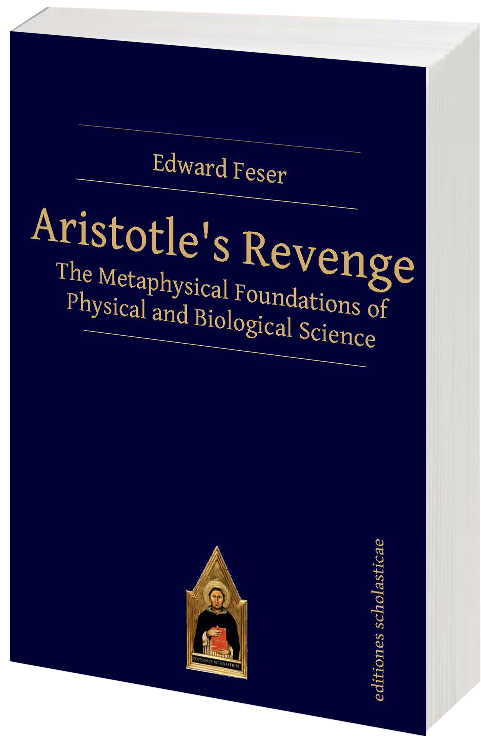The Metaphysical Foundations of Physical and Biological Science
Edward Feser
Abstract
Actuality and potentiality, substantial form and prime matter, efficient causality and teleology are among the fundamental concepts of Aristotelian philosophy of nature. Aristotle’s Revenge argues that these concepts are not only compatible with modern science, but are implicitly presupposed by modern science. Among the many topics covered are the metaphysical presuppositions of scientific method; the status of scientific realism; the metaphysics of space and time; the metaphysics of quantum mechanics; reductionism in chemistry and biology; the metaphysics of evolution; and neuroscientific reductionism. The book interacts heavily with the literature on these issues in contemporary analytic metaphysics and philosophy of science, so as to bring contemporary philosophy and science into dialogue with the Aristotelian tradition.
Table of Contents
0. Preface 1
1. Two philosophies of nature
1.1 What is the philosophy of nature? 3
1.2 Aristotelian philosophy of nature in outline 12
1.2.1 Actuality and potentiality 13
1.2.2 Hylemorphism 20
1.2.3 Limitation and change 27
1.2.4 Efficient and final causality 32
1.2.5 Living substances 39
1.3 The mechanical world picture 42
1.3.1 Key elements of the mechanical philosophy 43
1.3.2 Main arguments for the mechanical philosophy 52
2. The scientist and scientific method
2.1 The arch of knowledge and its “empiriometric” core 65
2.2. The intelligibility of nature 75
2.3 Subjects of experience 85
2.4 Being in the world 95
2.4.1 Embodied cognition 97
2.4.2 Embodied perception 106
2.4.3 The scientist as social animal 114
2.5 Intentionality 116
2.6 Connections to the world 124
2.7 Aristotelianism begins at home 132
3. Science and Reality
3.1 Verificationism and falsificationism 139
3.2 Epistemic structural realism 151
3.2.1 Scientific realism 151
3.2.2 Structure 158
3.2.3 Epistemic not ontic 171
3.3 How the laws of nature lie
(or at least engage in mental reservation) 177
3.4 The hollow universe 191
4. Space, Time, and Motion
4.1 Space 195
4.1.1 Does physics capture all there is to space? 195
4.1.2 Abstract not absolute 198
4.1.3 The continuum 204
4.2 Motion 208
4.2.1 How many kinds of motion are there? 208
4.2.2 Absolute and relative motion 212
4.2.3 Inertia 216
4.2.3.1 Aristotle versus Newton? 216
4.2.3.2 Why the conflict is illusory 216
4.2.3.3 Is inertia real? 225
4.2.3.4 Change and inertia 229
4.3 Time 233
4.3.1 What is time? 233
4.3.2 The ineliminability of tense 239
4.3.2.1 Time and language 239
4.3.2.2 Time and experience 243
4.3.3 Aristotle versus Einstein? 256
4.3.3.1 Making a metaphysics of method 256
4.3.3.2 Relativity and the A-theory 264
4.3.4 Against the spatialization of time 274
4.3.5 The metaphysical impossibility of time travel 282
4.3.6 In defense of presentism 269
4.3.7 Physics and the funhouse mirror of nature 303
5. The philosophy of matter
5.1 Does physics capture all there is to matter? 307
5.2 Aristotle and quantum mechanics 310
5.2.1 Quantum hylemorphism 312
5.2.2 Quantum mechanics and causality 324
5.3 Chemistry and reductionism 330
5.4 Primary and secondary qualities 340
5.5 Is computation intrinsic to physics? 351
5.5.1 The computational paradigm 352
5.5.2 Searle’s critique 359
5.5.3 Aristotle and computationalism 366
6. Animate nature
6.1 Against biological reductionism 375
6.1.1 What is life? 375
6.1.2 Genetic reductionism 384
6.1.3 Function and teleology 387
6.1.4 The hierarchy of life forms 391
6.2 Aristotle and evolution 400
6.2.1 Species essentialism 400
6.2.2 Natural selection is teleological 406
6.2.3 Transformism 420
6.2.4 Problems with some versions of
“Intelligent Design” theory 432
6.3 Against neurobabble 442
Bibliography 457
Index 499
With characteristic clarity and panache, Feser argues that the principles of Aristotelian and Thomistic philosophy, especially metaphysics and the philosophy of nature, are not challenged by developments in modern and contemporary science. Indeed, Feser thinks that a proper understanding of the natural sciences discloses the enduring value of these very principles. The book offers an excellent analysis of many of the key philosophical questions that lie at the heart of discourse about the implications of the physical and biological sciences. It is a very important resource for philosophers and scientists.
Dr. William E. Carroll, Aquinas Institute, Blackfriars, University of Oxford
“Scientists seek explanations for why nature is the way that it is. In this engaging and thought-provoking book, Ed Feser provides explanations both for why contemporary science is the way that it is and for why modern scientists think in the way that we do. It would be a pity if scientists did not read this book. It would help them realize that their often unacknowledged philosophical assumptions and idiosyncrasies actually reveal that they are closet Aristotelians at heart.”
Rev. Nicanor Pier Giorgio Austriaco, O.P., Ph.D., S.T.D., Professor of Biology and of Theology at Providence College, and Director, ThomisticEvolution.org
“A welcome sequel to Feser’s Scholastic Metaphysics, this book argues convincingly that modern science has not overcome Aristotle’s philosophy but rather presupposes it. Feser shows that, far from being vanquished, Aristotle provides ‘the true metaphysical foundations for the very possibility of that science.’”
Fr. Michael Dodds, O.P., Professor of Philosophy and Theology, Dominican School of Philosophy and Theology, Berkeley, California
About the Author
Edward Feser is Associate Professor of Philosophy at Pasadena City College in Pasadena, California, USA. His many books include Scholastic Metaphysics: A Contemporary Introduction, Aquinas, and the edited volume Aristotle on Method and Metaphysics.


